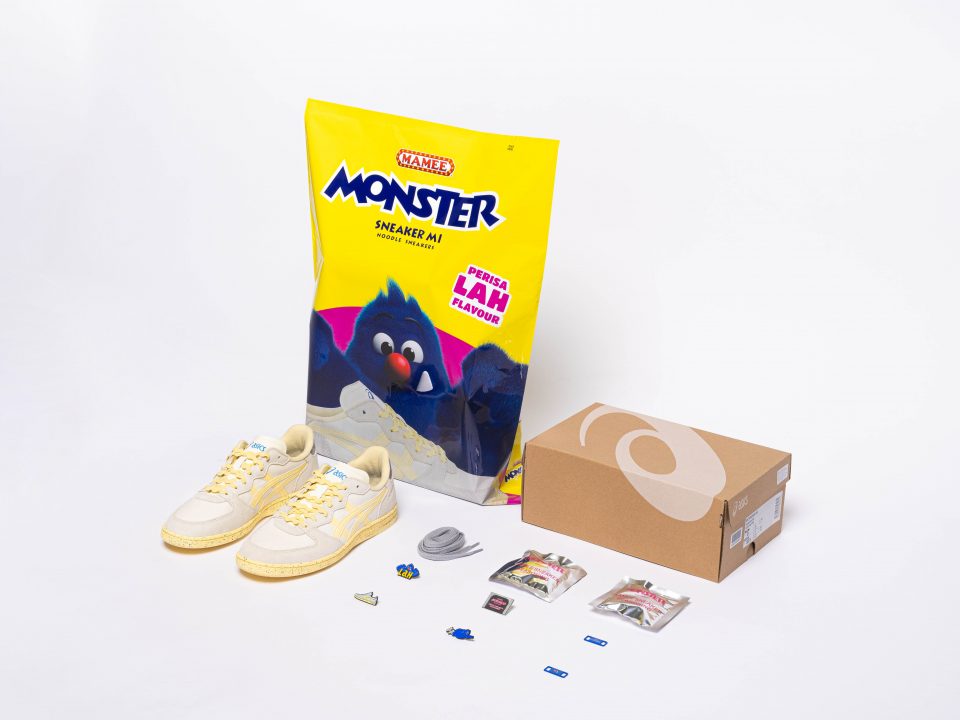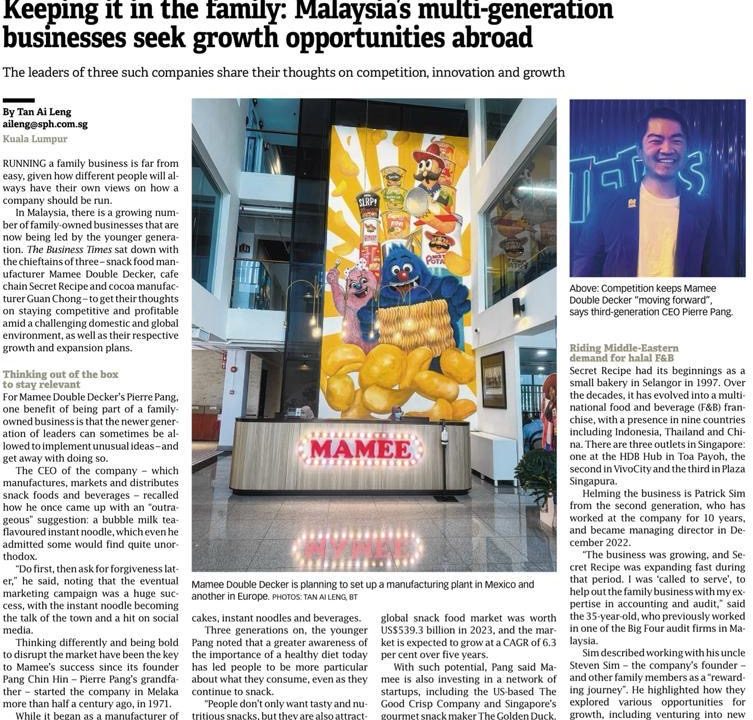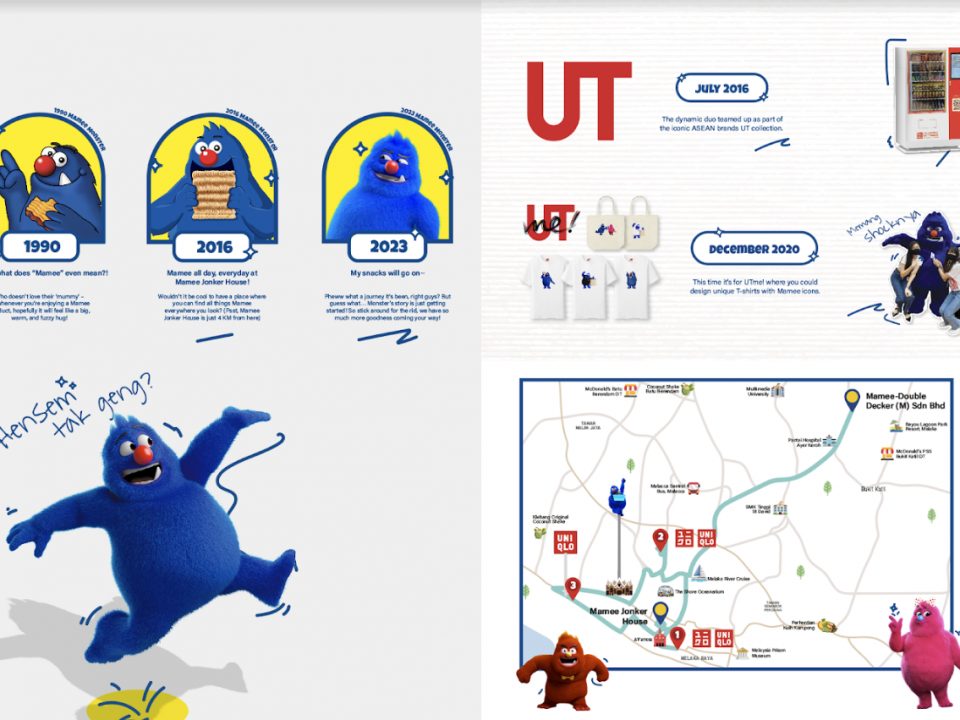

Now, even Manchester United loves Mamee
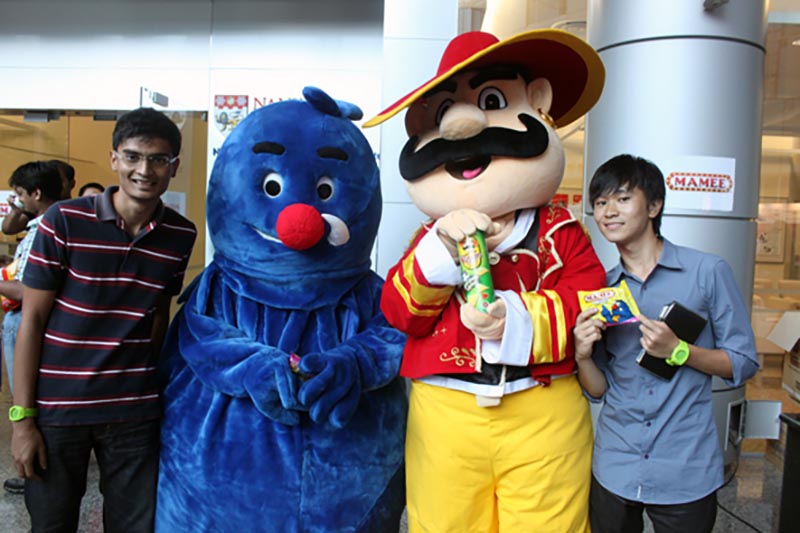
All kids in Singapore and Malaysia know and love Mamee Monster, the famous salty and crunchy noodle snack with a blue monster mascot. The product is certainly ubiquitous with childhood in this part of the world, comparable to Chupa Chups lollipops.
Photo: Mamee Monster (left) and Mister Potato (right).
Photos: Nanyang Technopreneurship Center
So I was excited to know that the guests for the Augest 12 session of the Entrepreneurship & Innovation Week would be Datuk Pang Tee Chew, CEO of Mamee Double Decker and his son Vuitton Pang, who is the company’s business development manager.
As part of the audience, I became a kid again. I gawked at the Mamee Monster and Mister Potato mascots as they posed for photographs, and licked my fingers after finishing the BBQ-flavored snack that were distributed to the attendees. I pouted when I got two packets while everyone else got one, and sulked when others got their bag of Mister Potato and I didn’t.
Yes, Mamee Double Decker, with a line-up of over 50 products, is powerful.They are also the market leader in potato chips in Malaysia, beating Pringles and Jack n’ Jill. In 2010, their annual revenue stood at RM428mil (US$143mil), with Australia and Singapore as its largest export markets.
That’s not all: Most recently, Mister Potato secured a partnership with Manchester United, one of the most storied football club in the world. The two sure seem like an odd couple, but my understanding is that the F&B company wants to leverage on the football brand’s reach in Asia. The football club also has an interest in Asia too, as indicated by their intention to raise US$1 billion from an IPO in Singapore.
The deal starts with the new season, and will end in 2014. The website states that football fans can look forward to “exciting contests, great giveaways, free merchandise, and even a chance to meet the Manchester United team themselves, at Old Trafford.”
The partnership is part of Mamee Double Decker’s ambitious plan to grow their annual revenue to RM1bil within five years. They hope to ride on the football club’s popularity in Asia to gain more market share.
Before they could dream of global domination, however, the company had very humble beginnings — they really struggled in their first two years. First, they got cheated by their business partner. Next, with limited cashflow and a lack of expertise in manufacturing, bankers were not confident of financing the company.
“My father never gave up. He continued going. In the end, a Malaysian industrial bank pitied him. But they financed him not because of the project but because of his determination,” said Datuk Pang.
Finally, with the loan, they started Mamee Double Decker, then called Lucky Noodles, in 1971, selling instant noodles and vermicelli. Datuk Pang joined the business a year later as a salesman going from shop to shop, seven days a week. He found out that they were up against tough competition, one of which was the well known Maggi noodles, manufactured by Nestlé. In fact, Nestlé even brought down their price just to deter Lucky from selling to the market, claimed Datuk Pang.
“I was scared to return to the factory. I got a lot of scolding from my father for not being able to sell the noodles. But I do sympathize with him as his entire savings went into the business. If we don’t do well, he’ll be close to bankrupcy.”
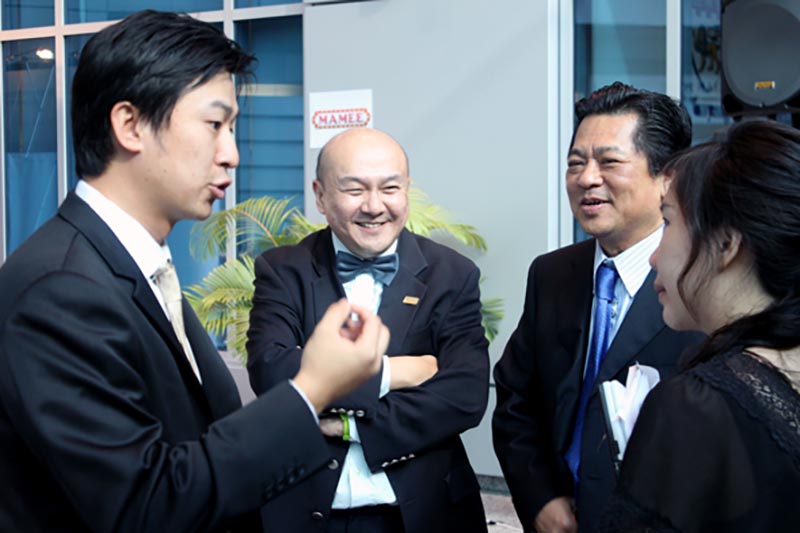
Vuitton Pang, business development manager at Mamee Double-Decker, Prof Hooi Den Huan, director at Nanyang Technopreneurship Center, and Datuk Pang Tee Chew, CEO of Mamee Double Decker.
Photos: Nanyang Technopreneurship Center
But things started turning around with Datuk Pang’s keen observation. While travelling the country selling noodles, he noticed that a lot of customers, especially rubber tappers in rural areas where a gas stove or heat wasn’t readily available, ate the product straight from the pack without cooking them.
That gave him an idea: Instead of selling instant noodles, why not pivot to crunchy noodle snacks instead? And within a few months, they adjusted their machinery to do just that.
The next problem they faced was branding. ‘Lucky’ was not exactly memorable. With a limited budget, they approached a young advertiser who just left Ogilvy & Mather to start his own agency. Both being new businesses, they decided to help one another.
“We needed something that was low budget but high impact.”
During one of their discussions, Datuk Pang related about how during his course of selling the noodles, his cheapest meal was wonton noodles, which cost around 30 cents at that time.
“I always asked for double portion, so I’ll say in Cantonese: ‘ma-mee’. And we thought, hey, that’s actually a good name!”
With that settled, they zoomed in on brand positioning. While rubber tappers were eating instant noodles as it is, they decided to focus on children instead. Hence the blue Mamee monster was born. They kept their product affordable enough for kids, without compromising on quality. Instantly, Mamee Monster caught fire.
Today, the company has expanded from their signature product into other brands like Cheers beverages, Nutrigen cultured milk, and Corntoz snacks. Mamee Monster now accounts for only 26% of their revenue.
One important lesson they’ve learnt is the necessity of having a good distribution network. A company may have the best product in the world, but without the ability to reach the furthest corners of the market, everything comes to naught.
Vuitton Pang said that whenever they expand to a new country, they would identify good partners and distributors to work with. “They are the key. Without distribution, all the money spent on branding goes to waste.”
For the younger ones in the Pang family, Mamee still pretty much runs in their veins. Although it is often said that many family business don’t last beyond the third generation, they are still passionate about the business — and most certainly Vuitton.
“We don’t sell our company because we know this is what we’ve always wanted to do,” said the former investment banker.
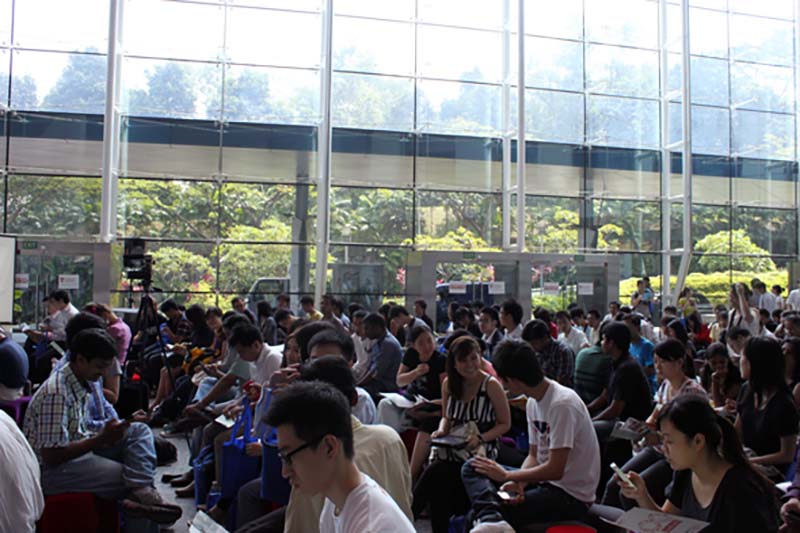
The foyer was packed with people.
Photos: Nanyang Technopreneurship Center
